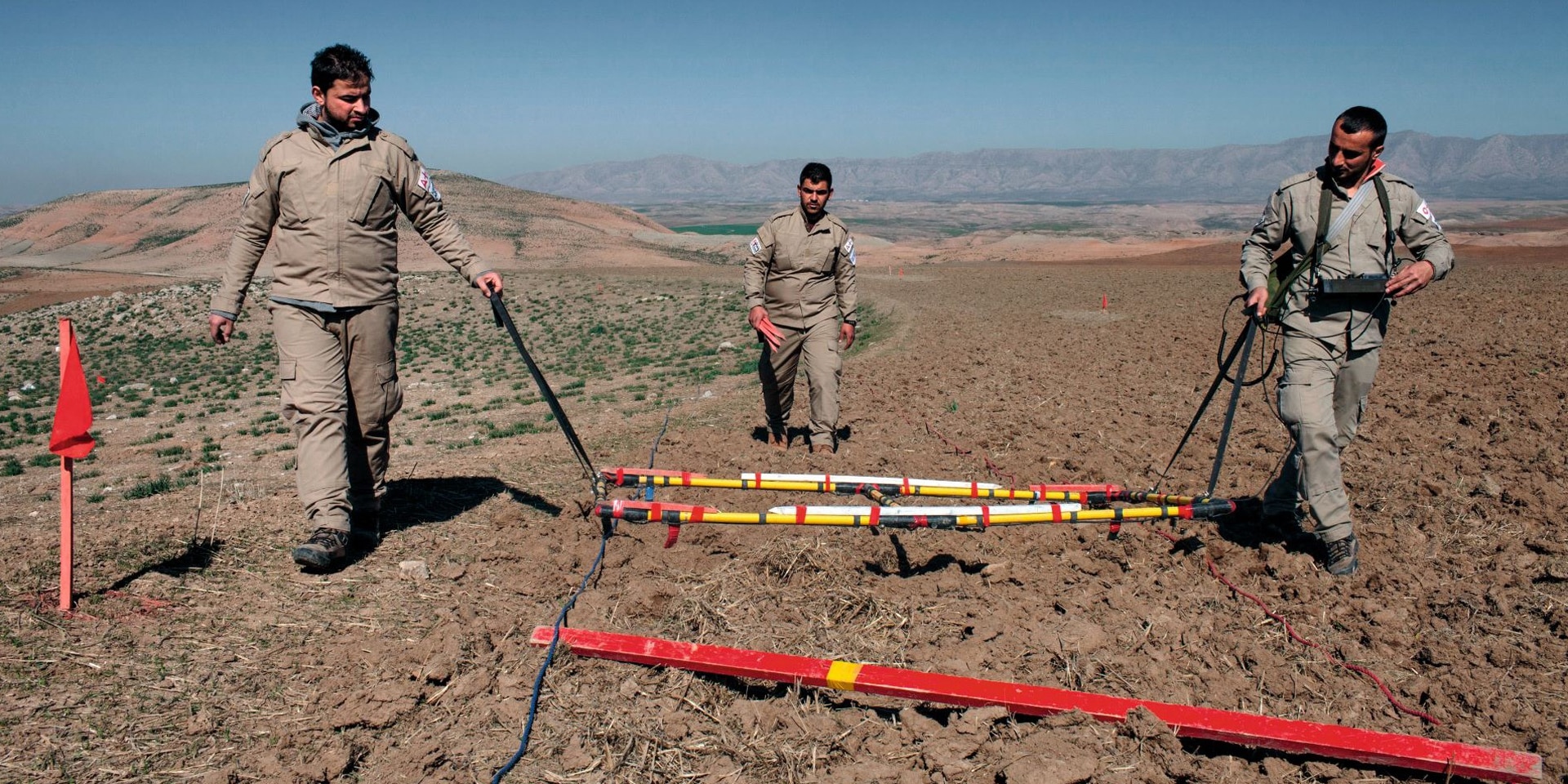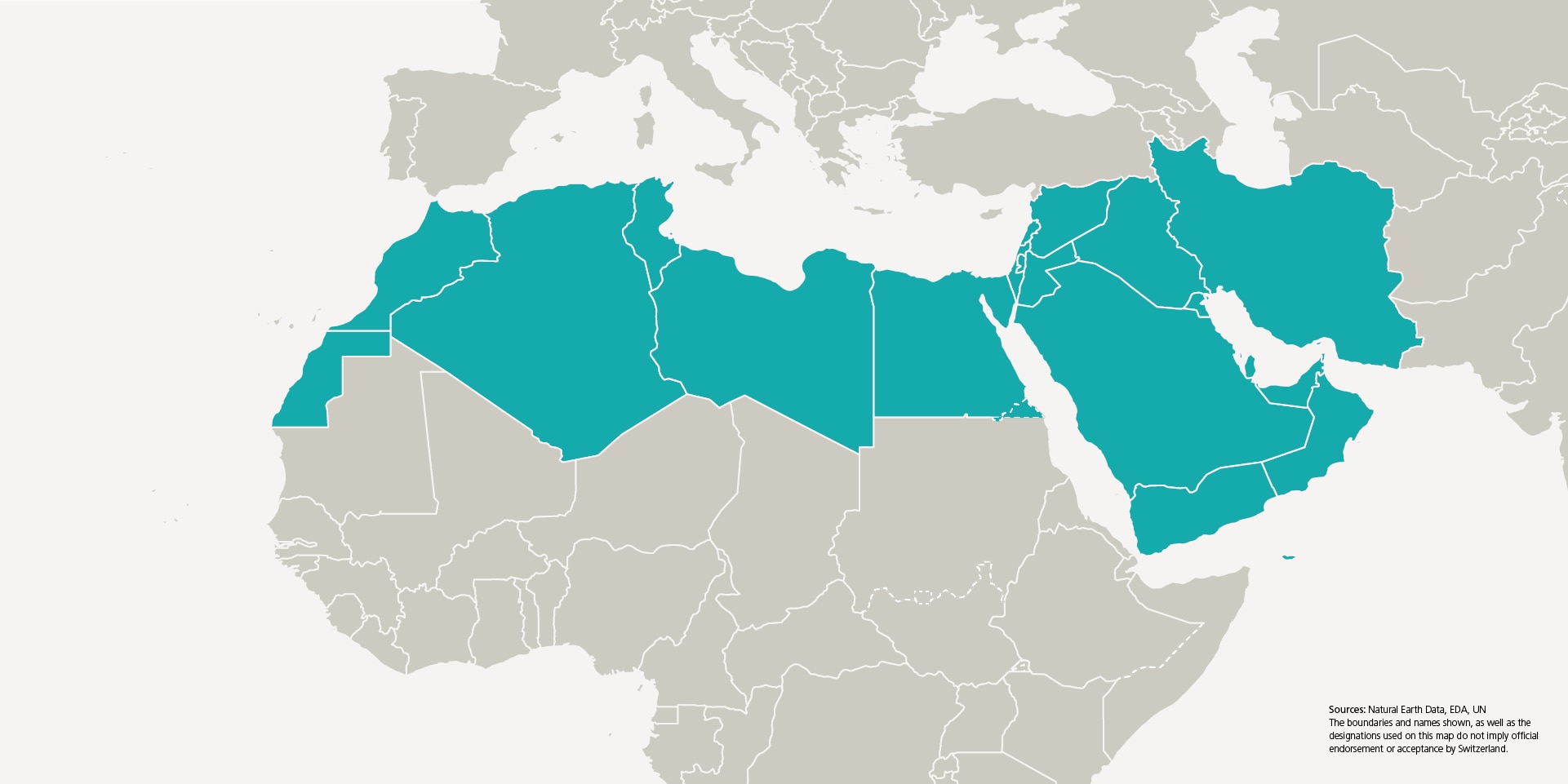Demining to promote sustainable development
In the run-up to International Mine Awareness Day on 4 April, the FDFA has published its 2020 annual report on Switzerland's mine action strategy. Switzerland is one of the ten largest donors to humanitarian demining efforts worldwide and is strengthening the capacity of local demining teams, providing assistance to victims, and promoting existing international conventions.

It will take many years to clear the anti-personnel mines and unexploded ordnance that remain scattered over wide areas in many parts of the world, like here in Iraq. © Lasting Footprints
Munib Al-Khatib, 27, from the town of Kafrsajna in Idlib governorate in western Syria, was walking to the nearby town of Ma'arat al-Nu'man one morning when a low-flying aircraft dropped over 100 cluster bombs. Several exploded on impact, killing or seriously injuring both combatants and civilians, including Al-Khatib. Others landed on both fallow and cultivated fields but failed to detonate. These unexploded cluster munitions will continue to pose a threat to life and limb for decades after the attack.
Khaled Hussein Mohammed is another victim of cluster munitions. He had a lucky escape during a cluster bomb strike that occurred when he was working his fields in Duhok in northern Iraq. But he later sustained serious injuries when his tractor accidentally triggered a cluster bomb on his land.
Fortunately, Mohammed has returned to his fields again, as a demining operation has completely cleared the area of unexploded cluster munition remnants. Mine action undertaken by part of the international community, including Switzerland, is thus contributing to the economic and social development of countries and territories affected by anti-personnel mines and unexploded ordnance, including remnants of cluster munitions.
Switzerland publishes 2020 annual report on its mine action strategy
It will take many years to clear the anti-personnel mines and unexploded ordnance that remain scattered over wide areas in many parts of the world. Moreover, the alarming evolution of the COVID-19 pandemic has put a strain on demining operations in many parts of the world. The global mine action community has nonetheless shown great resilience in the face of a highly volatile situation.
Switzerland makes a significant contribution to humanitarian demining worldwide. In 2020, it allocated CHF 17.6 million to humanitarian demining, mine risk education and assistance to victims. In addition, Switzerland is also helping to raise awareness of anti-personnel mines, strengthen the capacity of local demining teams and promote the implementation and universalisation of the various international mine action conventions.
Humanitarian demining also helps advance women's status in society
Valeria Otyrba is a young woman involved in a humanitarian demining project in her native Georgia. Her experience in Primorskoye, a mine risk area, led her to join the HALO Trust in 2017. Several thousand square kilometres of forest and agricultural and residential land in this breakaway region of Abkhazia on the Black Sea are still threatened by explosive remnants of war scattered over large areas. Switzerland provides funding to demining teams on the ground to help clear the region of anti-personnel mines. Otyrba is a member of one of the teams contributing to the mine clearance operation, a long process that is expected to be completed in May 2021.
Georgia is one of several countries where Switzerland is funding local demining teams (see box). Women's employment in mine action has improved women's status and roles in society. According to a GICHD report, the majority of women who have participated in mine clearance operations say that they now feel more confident about speaking their minds. Neddy Tembo, a 24-year-old deminer in Zimbabwe, is a good example. "Working as a deminer has made me feel equal to my male counterparts. The income I'm earning will help me to pursue my education and enable other family members to complete theirs."
These testimonials underscore the positive impact that stable employment in mine clearance operations can have on individuals' lives and illustrate the benefits of mine action for a broad cross-section of the affected population. In 2021, Switzerland will develop a new arms control and disarmament strategy with a focus on the role of new technologies.
Peace and security: one of the priorities of Switzerland's Foreign Policy Strategy 2020–23
Switzerland is working towards a safe and peaceful world where everyone can live safe from terror and misery, have their human rights protected and enjoy economic prosperity. Protecting civilian populations is a key aspect of this effort.
Switzerland's international reputation is in good part based on its humanitarian tradition. Switzerland's relief missions to regions impacted by crises and conflicts are based on the principles of impartiality and solidarity. Their primary focus is to address the needs and safety of those affected, and to respect their rights and dignity. Indeed, peace and security are among the priorities of Switzerland's Foreign Policy Strategy 2020–23 (FPS).
Switzerland's mine action strategy facilitated assistance to 15 countries worldwide in 2020. Switzerland has contributed to demining operations in most of these countries (Bosnia and Herzegovina, Cambodia, Colombia, Croatia, Georgia, Myanmar, Kosovo, Sri Lanka, Zimbabwe). It has also undertaken to strengthen mine risk education and victim assistance (Ukraine, Cambodia, Colombia, Bosnia and Herzegovina, Myanmar, Syria). Finally, as noted in the FPS, Switzerland seconds a number of experts to UN missions in the Western Sahara and in the Democratic Republic of the Congo, Mali and South Sudan in the sub-Saharan region.

